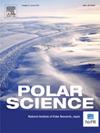The one who takes your breath away in the polar region: A systematic review
IF 1.5
4区 地球科学
Q3 ECOLOGY
引用次数: 0
Abstract
The Antarctic was unexplored by humans until the adoption of the Antarctic Treaty in 1961, which then was permanently designated for peaceful purposes and scientific exploration. As the Antarctic national programs and tourism operations expand, there is an increase in the chance of direct human-wildlife conflicts and adverse impacts on endemic fauna and flora, as well as the hazards of infectious disease introduction. Along with this growth, little is known about the chances of infectious disease in the polar region compared to other parts of the world. This review aims to provide a conceptual systematic review of infectious diseases and their effects on Antarctica ecosystems. We hypothesised that infectious diseases in or from Antarctica can be transmitted to researchers or visitors back to their home countries. The protocol was registered with PROSPERO (CRD42023400732). A literature search is done using the online databases: PubMed, Web of Science, and Scopus limited to February 2023, open access. Articles from PubMed (n = 40), Web of Science (n = 48), and Scopus (n = 89) were identified. For full-text extraction, articles from PubMed (n = 4), Web of Science (n = 5), Scopus (n = 6), and hand searching (n = 1) were assessed for eligibility, resulting in the exclusion of two duplicates. Finally, 4 out of 14 articles were found to be associated with zoonosis. Thus, this review provides details on possible zoonosis in Antarctica that may affect the ecosystem.
在极地地区让你屏息的人:系统回顾
在1961年《南极条约》通过之前,人类从未对南极进行过探索。此后,南极条约被永久指定用于和平目的和科学探索。随着南极国家计划和旅游业务的扩大,人类与野生动物直接冲突的可能性增加,对当地动植物的不利影响也增加,传染病传入的危险也增加。随着这种增长,与世界其他地区相比,人们对极地地区传染病的可能性知之甚少。本综述旨在对传染病及其对南极洲生态系统的影响进行概念性系统综述。我们假设,在南极洲或来自南极洲的传染病可以传播给研究人员或返回本国的游客。该协议已在PROSPERO注册(CRD42023400732)。文献检索是使用在线数据库完成的:PubMed, Web of Science和Scopus限于2023年2月,开放获取。文章来自PubMed (n = 40)、Web of Science (n = 48)和Scopus (n = 89)。对于全文提取,我们评估了PubMed (n = 4)、Web of Science (n = 5)、Scopus (n = 6)和手工检索(n = 1)的文章是否符合条件,排除了两个重复的文章。最后,发现14篇文章中有4篇与人畜共患病有关。因此,本综述提供了南极洲可能影响生态系统的人畜共患病的详细情况。
本文章由计算机程序翻译,如有差异,请以英文原文为准。
求助全文
约1分钟内获得全文
求助全文
来源期刊

Polar Science
ECOLOGY-GEOSCIENCES, MULTIDISCIPLINARY
CiteScore
3.90
自引率
5.60%
发文量
46
期刊介绍:
Polar Science is an international, peer-reviewed quarterly journal. It is dedicated to publishing original research articles for sciences relating to the polar regions of the Earth and other planets. Polar Science aims to cover 15 disciplines which are listed below; they cover most aspects of physical sciences, geosciences and life sciences, together with engineering and social sciences. Articles should attract the interest of broad polar science communities, and not be limited to the interests of those who work under specific research subjects. Polar Science also has an Open Archive whereby published articles are made freely available from ScienceDirect after an embargo period of 24 months from the date of publication.
- Space and upper atmosphere physics
- Atmospheric science/climatology
- Glaciology
- Oceanography/sea ice studies
- Geology/petrology
- Solid earth geophysics/seismology
- Marine Earth science
- Geomorphology/Cenozoic-Quaternary geology
- Meteoritics
- Terrestrial biology
- Marine biology
- Animal ecology
- Environment
- Polar Engineering
- Humanities and social sciences.
 求助内容:
求助内容: 应助结果提醒方式:
应助结果提醒方式:


